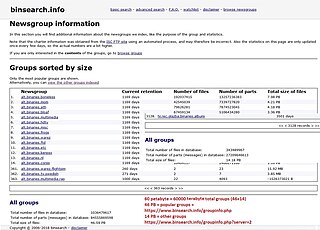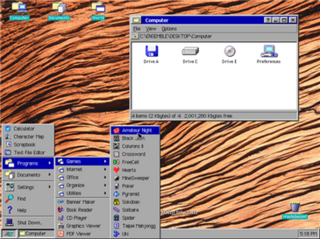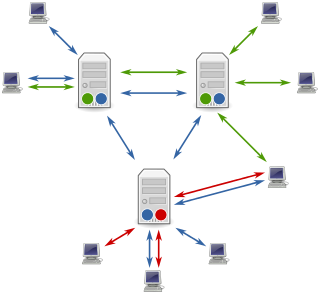A frequently asked questions (FAQ) list is often used in articles, websites, email lists, and online forums where common questions tend to recur, for example through posts or queries by new users related to common knowledge gaps. The purpose of a FAQ is generally to provide information on frequent questions or concerns; however, the format is a useful means of organizing information, and text consisting of questions and their answers may thus be called a FAQ regardless of whether the questions are actually frequently asked.

James Parry, commonly known by his nickname and username Kibo, is a Usenetter known for his sense of humor, various surrealist net pranks, an absurdly long signature, and a machine-assisted knack for "kibozing": joining any thread in which "kibo" was mentioned. His exploits have earned him a multitude of enthusiasts, who celebrate him as the head deity of the parody religion "Kibology", centered on the humor newsgroup alt.religion.kibology.
A Usenet newsgroup is a repository usually within the Usenet system, for messages posted from users in different locations using the Internet. They are discussion groups and are not devoted to publishing news. Newsgroups are technically distinct from, but functionally similar to, discussion forums on the World Wide Web. Newsreader software is used to read the content of newsgroups.

vi is a screen-oriented text editor originally created for the Unix operating system. The portable subset of the behavior of vi and programs based on it, and the ex editor language supported within these programs, is described by the Single Unix Specification and POSIX.

Xenix is a discontinued version of the Unix operating system for various microcomputer platforms, licensed by Microsoft from AT&T Corporation in the late 1970s. The Santa Cruz Operation (SCO) later acquired exclusive rights to the software, and eventually replaced it with SCO UNIX.
The Usenet newsgroup alt.religion.scientology started in 1991 to discuss the controversial beliefs of Scientology, as well as the activities of the Church of Scientology, which claims exclusive intellectual property rights thereto and is viewed by many as a dangerous cult. The newsgroup has become the focal point of an aggressive battle known as Scientology versus the Internet, which has taken place both online and in the courts.
alt.binaries.slack is a Usenet newsgroup created for the purpose of posting pictures, sounds, and utilities related to the Church of the SubGenius, making them available for everyone to see and hear. Because the Church of the SubGenius is well known for encouraging sick and twisted humor, the newsgroup is also home to artists who post humorous artwork of all sorts. A fair amount of the pictures on alt.binaries.slack are adult-oriented, and may be considered offensive by some viewers. The denizens of the newsgroup state that they enjoy deliberately offending those who are too easily offended.

The alt.* hierarchy is a major class of newsgroups in Usenet, containing all newsgroups whose name begins with "alt.", organized hierarchically. The alt.* hierarchy is not confined to newsgroups of any specific subject or type, although in practice more formally organized groups tend not to occur in alt.*. The alt.* hierarchy was created by John Gilmore and Brian Reid.

The Iyonix PC was an Acorn-clone personal computer sold by Castle Technology and Iyonix Ltd between 2002 and 2008. According to news site Slashdot, it was the first personal computer to use Intel's XScale processor. It ran RISC OS 5.
Sporgery is the disruptive act of posting a flood of articles to a Usenet newsgroup, with the article headers falsified so that they appear to have been posted by others. The word is a portmanteau of spam and forgery, coined by German software developer, and critic of Scientology, Tilman Hausherr.
alt.sex is a Usenet newsgroup – a discussion group within the Usenet network – relating to human sexual activity. It was popular in the 1990s. An October 1993 survey by Brian Reid reported an estimated worldwide readership for the alt.sex newsgroup of 3.3 million, that being 8% of the total Usenet readership, with 67% of all Usenet "nodes" carrying the group. At that time, alt.sex had an estimated traffic of 2,300 messages per month.
Eternal September or the September that never ended is Usenet slang for a period beginning around 1993 when Internet service providers began offering Usenet access to many new users. The flood of new users overwhelmed the existing culture for online forums and the ability to enforce existing norms. AOL followed with their Usenet gateway service in March 1994, leading to a constant stream of new users. Hence, from the early Usenet point of view, the influx of new users in September 1993 never ended.

GEOS is a computer operating environment, graphical user interface (GUI), and suite of application software. Originally released as PC/GEOS, it runs on DOS-based, IBM PC compatible computers. Versions for some handheld platforms were also released and licensed to some companies.

The Tanenbaum–Torvalds debate was a written debate between Andrew S. Tanenbaum and Linus Torvalds, regarding the Linux kernel and kernel architecture in general. Tanenbaum, the creator of Minix, began the debate in 1992 on the Usenet discussion group comp.os.minix, arguing that microkernels are superior to monolithic kernels and therefore Linux was, even in 1992, obsolete. The debate has sometimes been considered a flame war.
Control messages are a special kind of Usenet post that are used to control news servers. They differ from ordinary posts by a header field named Control. The body of the field contains control name and arguments.
A Usenet personality was a particular kind of Internet celebrity, being an individual who gained a certain level of notoriety from posting on Usenet, a global network of computer users with a vast array of topics for discussion. The platform is usually anonymous, although users can get celebrity status, usually by being deemed different from other posters in some way.
Ralf Brown's Interrupt List is a comprehensive list of interrupts, calls, hooks, interfaces, data structures, CMOS settings, memory and port addresses, as well as processor opcodes and special function registers for x86 machines from the 1981 IBM PC up to 2000, most of it still applying to IBM PC compatibles today.

Usenet, USENET, or "in full", User's Network, is a worldwide distributed discussion system available on computers. It was developed from the general-purpose Unix-to-Unix Copy (UUCP) dial-up network architecture. Tom Truscott and Jim Ellis conceived the idea in 1979, and it was established in 1980. Users read and post messages to one or more topic categories, known as newsgroups. Usenet resembles a bulletin board system (BBS) in many respects and is the precursor to the Internet forums that have become widely used. Discussions are threaded, as with web forums and BBSes, though posts are stored on the server sequentially.
Control-Alt-Delete is a computer keyboard command on IBM PC compatible computers, invoked by pressing the Delete key while holding the Control and Alt keys: Ctrl+Alt+Delete. The function of the key combination differs depending on the context but it generally interrupts or facilitates interrupting a function. For instance, in pre-boot environment or in MS-DOS, Windows 3.0 and earlier versions of Windows or OS/2, the key combination reboots the computer. Starting with Windows 95, the key combination invokes a task manager or security related component that facilitates ending a Windows session or killing a frozen application.
The Meow Wars were an early example of a flame war sent over Usenet which began in 1996 and ended circa 1998. Its participants were known as "Meowers". The war was characterized by posters from one newsgroup "crapflooding", or posting a large volume of nonsense messages, to swamp on-topic communication in other groups. Ultimately, the flame war affected many boards, with Roisin Kiberd writing in Motherboard, a division of Vice, that esoteric Internet vocabulary was created as a result of the Meow Wars.







